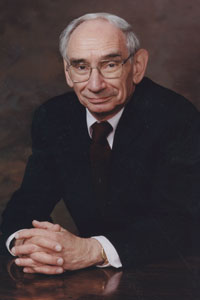Anthony Oettinger
| Anthony Oettinger | |
|---|---|
 |
|
| Born |
March 29, 1929 Nuremberg, Germany |
| Alma mater | Harvard University |
| Occupation | Retired |
| Years active | 1954–2011 |
| Spouse(s) | Married Marilyn Tanner, 1954 |
| Children | Two |
Anthony "Tony" Gervin Oettinger (born 29 March 1929 in Nuremberg, Germany) is a linguist and computer scientist best known for his work on information resources policy. Oettinger coined the term “compunications” in the late 1970s to describe the combination of computer and telecommunications technologies that would take place as digital technologies replaced analog forms. In 1973 he co-founded, with John LeGates, the Program on Information Resources Policy at Harvard University. He served as a consultant to the President’s Foreign Intelligence Advisory Board and the National Security Council and NASA’s Apollo moon-landing program. From 1966 to 1968 he was president of the Association for Computing Machinery (ACM). He was recognized for his work in the intelligence community with the naming of the Anthony G. Oettinger School of Science and Technology Intelligence of the National Intelligence University. He is Gordon McKay Professor of Applied Mathematics and Professor of Information Resources Policy, Emeritus, at Harvard.
Oettinger was born in 1929 in Nuremberg, Germany to a French mother and German father. Nuremberg was where Hitler first established his political base and was the home of the Nazi party. Oettinger has said that “this probably saved my life, because my parents had the wit to notice what was going on.” In 1933, when he was four years old, his parents left to live with his grandparents in France. Getting caught up in the German march into France, his family arrived in New York in 1941 via Spain and Portugal. At the age of 12, English thus became his third language.
Oettinger graduated from the Bronx High School of Science and entered Harvard, when his first choice, MIT, did not offer him a scholarship and Harvard did. He received his A.B. summa cum laude in 1951, having studied Spanish and French literature, Russian, economics and mathematics. He was elected to Phi Beta Kappa as well as the chapter's First Marshall his junior year. Also as a junior he started working with Howard Aiken in the Computation Laboratory and acquired an interest in machine translation. By 1954 he had completed his Ph.D. in Applied Mathematics at Harvard, with a dissertation on "A study for the design of an automatic dictionary". He joined the Harvard faculty two years later first as an instructor (1955–1957), then an assistant professor (1957–1960), associate professor (1960–1963), and then as a full professor in linguistics (1964–1975) and in applied mathematics (1964– ). When he became a tenured professor in 1960 at the age of 31 he was the youngest to have achieved that status at Harvard.
...
Wikipedia
